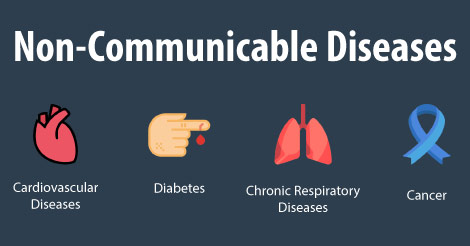- A non-communicable disease is a non-infectious health condition that cannot be spread from person to person. It also lasts for a long period of time. This is also known as a chronic disease.
- A combination of genetic, physiological, lifestyle, and environmental factors can cause these diseases. Some risk factors include:
- unhealthy diets
- lack of physical activity
- smoking and second hand smoke
- excessive use of alcohol
- Noncommunicable diseases kill around 40 million people each year. This is about 70 percent of all deaths worldwide.
- Noncommunicable diseases affect people belonging to all age groups, religions, and countries.
- Noncommunicable diseases are often associated with older people. However, 15 million annual deaths from noncommunicable diseases occur among people aged 30 to 69.
- More than 85 percent of these deaths occur in low- and middle-income countries and in vulnerable communities where access to preventative healthcare is lacking.
- Some noncommunicable diseases are more common than others. The four main types of noncommunicable diseases include cardiovascular disease, cancer, chronic respiratory disease, and diabetes.
